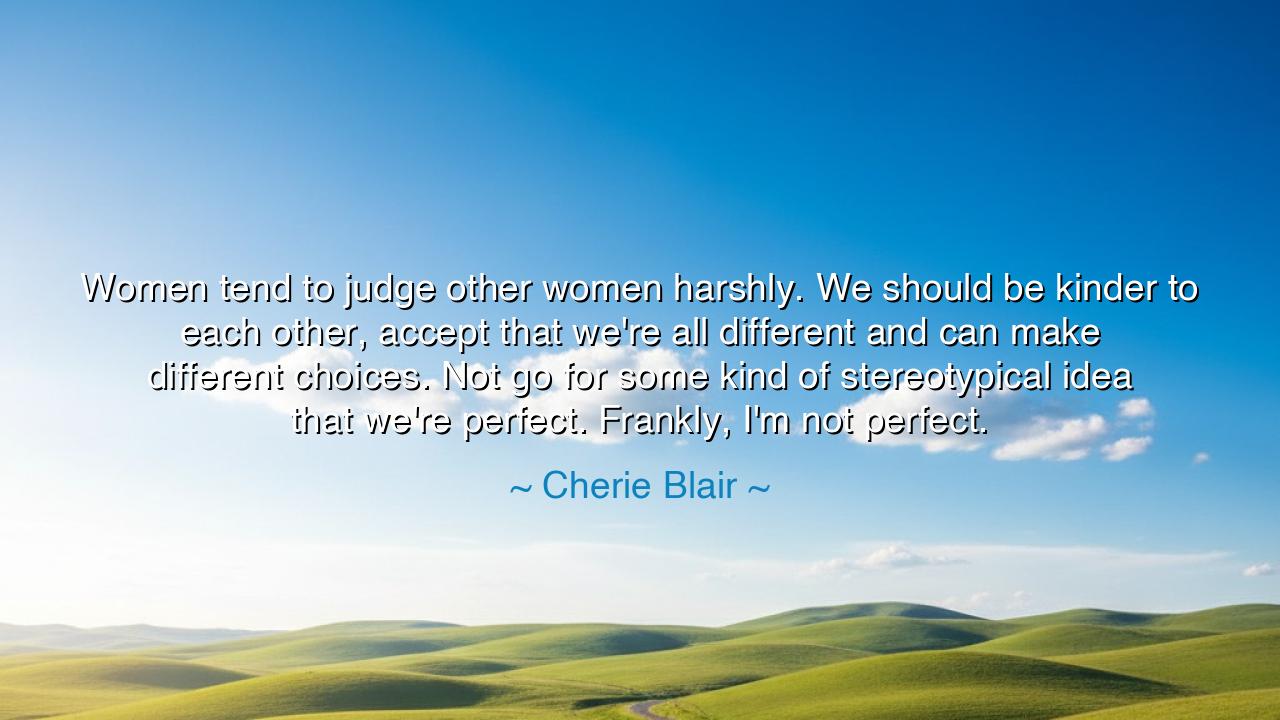
Women tend to judge other women harshly. We should be kinder to
Women tend to judge other women harshly. We should be kinder to each other, accept that we're all different and can make different choices. Not go for some kind of stereotypical idea that we're perfect. Frankly, I'm not perfect.






The words of Cherie Blair — “Women tend to judge other women harshly. We should be kinder to each other, accept that we’re all different and can make different choices. Not go for some kind of stereotypical idea that we’re perfect. Frankly, I’m not perfect.” — resound with humility and truth. Spoken by a woman who stood in the harsh light of public life, they carry both confession and counsel. Blair, a lawyer and the wife of a prime minister, knew the sting of scrutiny, and from her wounds she called for compassion.
The meaning is deep: society has long placed impossible burdens upon women, demanding that they conform to ideals of beauty, purity, motherhood, or success, and when they fail to match these, judgment falls fiercest not from men, but from other women. Blair’s call is for gentleness, for the recognition that each soul must walk its own path. To be different is not to be lesser, and to make different choices is not to be condemned. In admitting “I am not perfect,” she speaks a universal truth: no one is.
History offers proof of this struggle. Consider the life of Eleanor Roosevelt, who endured relentless criticism for her appearance and her activism, often from other women who judged her for not fitting traditional roles. Yet Eleanor chose to serve, to speak, and to labor for justice, carrying herself not as one flawless but as one faithful. She too understood what Blair proclaimed: that greatness does not lie in perfection, but in courage to live authentically despite judgment.
Blair’s words are also a summons to solidarity. For when women judge each other harshly, they reinforce the very chains that patriarchy has long used to divide them. But when they are kinder, when they embrace each other’s differences, they build a fortress of strength against the voices that would silence them. Unity among women is not born from sameness, but from the acceptance of choices, from lifting one another rather than tearing down.
Let this wisdom endure: cast aside the false idol of perfection, for it is a mirage that enslaves rather than liberates. Embrace instead the truth that to be human is to stumble, to err, to grow. Cherie Blair’s voice, tempered by experience, calls across the generations: let women cease to be each other’s harshest critics, and instead become each other’s fiercest allies. For only through kindness and acceptance will true freedom be won.






HVVan hy Vo
This quote really resonates with me because it addresses the unspoken reality that women can sometimes be their own harshest critics. I love the idea of accepting each other’s differences and showing kindness, but I think it’s a challenge in a world that constantly tells us how to look, behave, and succeed. Can we ever truly embrace imperfection, or will the pressure to be ‘perfect’ always find its way into how we judge ourselves and others?
TTMai Thanh Tam
Cherie Blair’s quote is a great reminder that we’re all human and none of us are perfect. The judgment women often place on each other is unfortunate and harmful, and we should focus more on being supportive. But is it realistic to think that we can completely move away from these stereotypes? Can we shift from competition to collaboration, especially when society still pushes these images of perfection for women?
CDCuong Diep
This quote highlights something that’s often overlooked—the way women judge each other more harshly than they might judge men. It’s almost like there’s this expectation that women should be flawless in every way, and that’s a heavy burden. I like the idea of being kinder and more accepting, but how do we break out of the cycle of judgment? Is it about changing our perspective on success, beauty, and what it means to be a woman?
DNDong Nghi
I agree with the sentiment here, but it’s hard not to wonder why women tend to be so harsh toward each other. Is it because of societal conditioning, or is it just human nature to compare ourselves to others? I think the key message here is about embracing our differences, but how do we overcome the pressure of fitting into specific molds that society often sets for women? It’s a struggle many of us face daily.
TBTHI BAO
Cherie Blair’s words really hit home. Women often get caught up in judging each other, especially in terms of appearance or life choices, and that can be damaging. The idea of kindness and acceptance is so needed, but how can we encourage more of this? Do we need to change how we view success, beauty, or motherhood in society? It seems like the root of judgment often comes from unrealistic expectations.